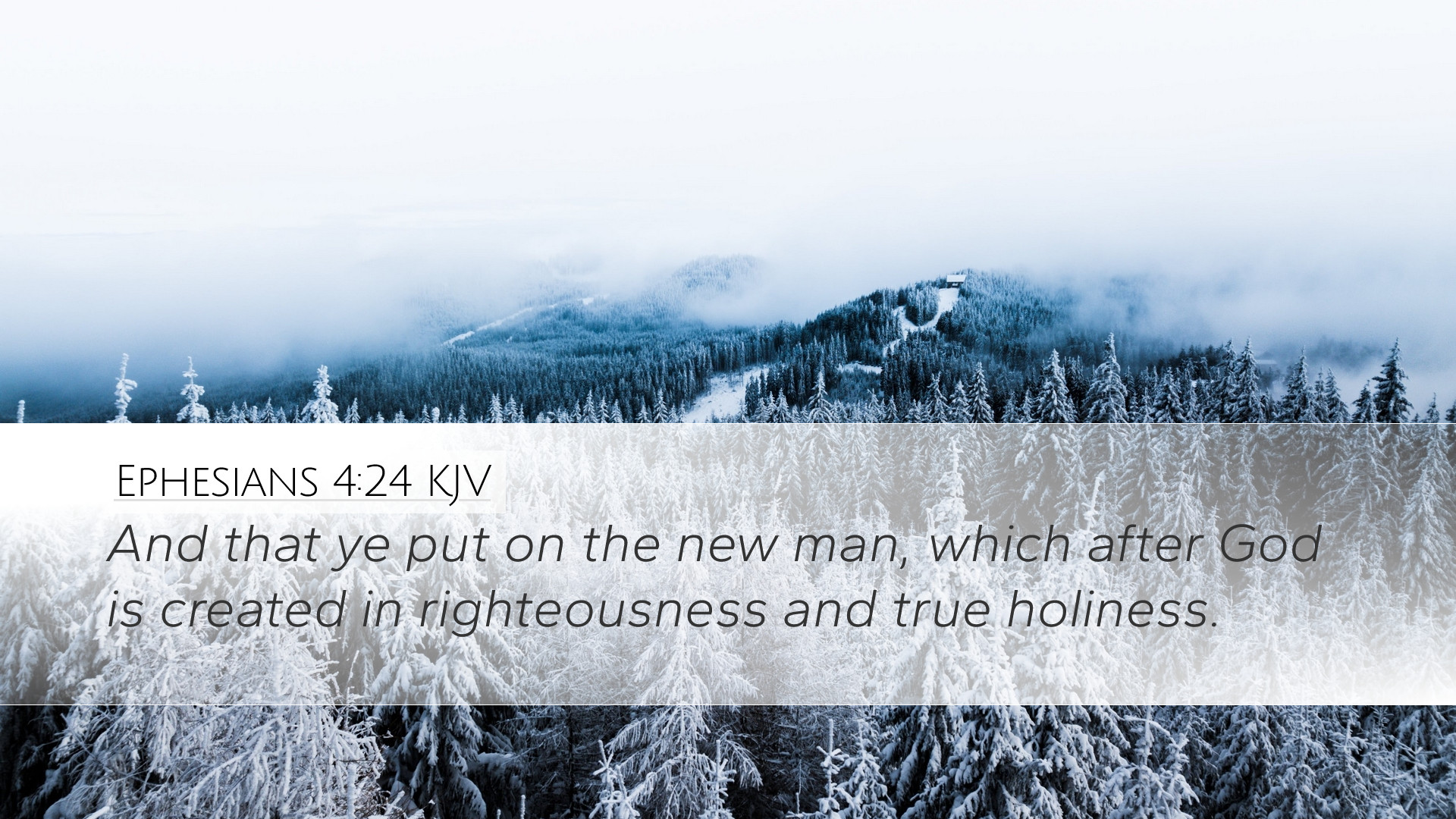Ephesians 4:24 - A Commentary
Ephesians 4:24 states: "And that ye put on the new man, which after God is created in righteousness and true holiness." This verse is a pivotal directive in the Pauline epistle, emphasizing the transformative power of faith and the divine nature bestowed upon believers. The following commentary draws from the insights of notable theologians including Matthew Henry, Albert Barnes, and Adam Clarke.
Understanding "The New Man"
The phrase "the new man" signifies the believer's renewal in Christ. This transformation entails a radical change in identity and behavior, aligning with the teachings of Christ. According to Matthew Henry, the "new man" is created by God Himself, implying an element of divine initiative in our sanctification process. It is a profound change that encompasses not only moral rectitude but also a new spiritual state.
The Divine Creation
The verse asserts that this new man is "created in righteousness and true holiness." Albert Barnes elaborates on the significance of righteousness and holiness, noting that they are not merely attributes but should be characteristic of the life of a Christian. Righteousness reflects the ethical and moral standards God exemplifies, while holiness denotes a state of being set apart for God.
Adam Clarke emphasizes that this "creation" occurs in a believer's heart, signifying an inward renewal that manifests in outward behavior. This contrasts sharply with the previous state of sinfulness, underscoring the theme of regeneration inherent in the Christian faith.
The Process of Renewal
The act of putting on the new man implies an active participation in this transformative process. Matthew Henry identifies this as a deliberate choice made by believers, which aligns with the broader theme of living a life that reflects one's faith. It is not a passive state; rather, believers are called to consciously cultivate their faith and embody the attributes of the new creation.
- Faith as a Catalyst: Faith is foundational for this transformation; it is through faith that believers are equipped to embrace their new identity.
- Daily Renewal: The process of putting on the new man often requires daily discipline and commitment to spiritual practices such as prayer, studying the Scriptures, and engaging with fellow believers.
- Community and Accountability: Living in community with other believers acts as an important support system in pursuing the righteousness and holiness that this new man embodies.
The Nature of Righteousness and Holiness
The righteousness referenced in Ephesians 4:24 is both a positional standing before God and a practical way of living. Albert Barnes articulates that believers are justified before God, but they are also called to manifest that justification through righteous deeds. This dual aspect encourages an authentic Christian life that reflects both faith and works.
Adam Clarke discusses holiness as the outworking of a relationship with God. The believer’s behavior should not only conform to moral standards but should also reflect an inner purity and dedication to God’s purposes.
The Context of Ephesians 4:24
This verse is situated within a larger discourse on Christian living. In the preceding verses, Paul calls the Ephesian church to abandon their old ways—the "former conversation"—and to adopt the new life found in Christ. Matthew Henry notes that understanding the shift from the old to the new is crucial for grasping the full implications of this transformation.
Exhortation to Action
The imperative nature of this verse—“put on”—positions the believer in an active role regarding their spiritual journey. Albert Barnes emphasizes that this participation is not merely superficial; it suggests a comprehensive and profound metamorphosis involving the mind, will, and heart.
Adam Clarke presents this putting on as an expression of faith leading to a corresponding change in lifestyle. It reflects the internal work of the Holy Spirit in the believer’s life, prompting outward expressions of faith through conduct and conversation.
The Theological Implications
Ephesians 4:24 carries significant theological weight. It speaks to the heart of regeneration and sanctification within the Christian faith. Matthew Henry points out that this transformation is both immediate and progressive: believers are instantly declared new creations in Christ, yet they are also engaged in ongoing growth towards true holiness.
Implications for Doctrine
- Regeneration: The notion of being "created" speaks to the transformative power of regeneration—an essential doctrine of the Christian faith that underlines the need for believers to be made new in spirit.
- Sanctification: The call to “put on” indicates an ongoing work of sanctification, where believers must actively seek to grow in their faith.
- Identity in Christ: The concept of the new identity in Christ lays a foundation for understanding Christian ethics and behavior.
Concluding Thoughts
Ephesians 4:24 serves as a powerful reminder of the believer's calling to live in accordance with their new identity in Christ. By becoming "the new man," believers are encouraged to pursue righteousness and holiness actively and intentionally. As they embody these characteristics, they reflect the transformative work of God in their lives, providing a compelling witness to the world around them. The insights drawn from the commentaries of Matthew Henry, Albert Barnes, and Adam Clarke guide believers, pastors, and theologians alike in understanding the profound implications of this verse and inspire them to embrace the fullness of life in Christ.


